15 African Grey Parrot Care Guide Tips
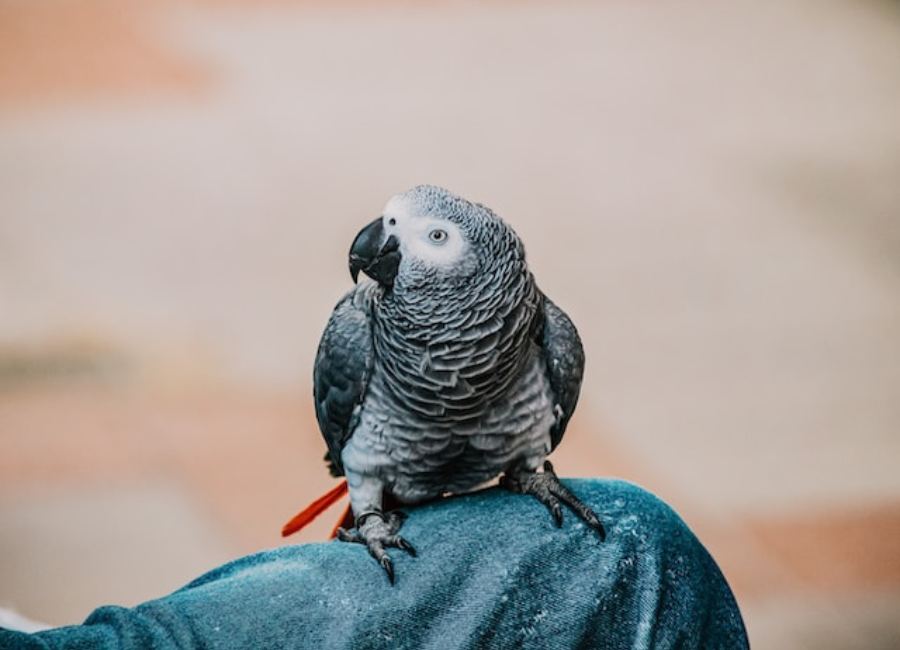
Are you a proud owner of an African grey parrot or considering getting one as a pet? These intelligent and social birds are incredibly fascinating creatures that require special care and attention.
In this African Grey parrot care guide, we will discuss everything you need to know about providing the best possible care for your feathered friend.
From diet and grooming to housing and enrichment, we’ve got you covered.
So, let’s dive in and learn how to keep your African grey parrot happy and healthy!
African Grey Parrot Care Guide
Welcome to the African Grey parrot care guide, where we’ll explore the essentials of keeping these intelligent and charismatic birds happy and healthy.
From providing a spacious and stimulating environment to offering a balanced diet rich in fresh fruits and vegetables, caring for an African Grey Parrot requires dedication and knowledge.
Let’s get started!
Here are some of the most important African Grey parrot care guide you should know:
1. Providing a spacious cage
When it comes to caring for your African Grey parrot, providing a spacious cage is essential.
These intelligent and active birds need room to spread their wings and explore. As a general guideline, the minimum cage size for an African Grey should be around 3 feet wide, 2 feet deep, and 4 feet tall.
This will give your parrot enough space to move around comfortably.
Now, let’s talk about bedding. For the cage floor, it’s best to use newspaper or paper towels, as they are easy to clean and replace.
Avoid using sand or gravel, as they can be harmful if ingested, also avoid using cedar or pine, as the strong aroma can be harmful to your feathered friend.
Remember, the cage should also have plenty of perches of varying sizes and textures to keep your parrot’s feet healthy.
2. Offering a high-quality varied diet
When it comes to caring for your African Grey Parrot, offering a high-quality varied diet is crucial.
These intelligent birds have specific nutrient requirements that need to be met to ensure their overall health and well-being.
To provide a balanced diet, include a mix of fruits, vegetables, grains, and proteins.
Offer a variety of fresh fruits like apples, berries, and oranges, along with leafy greens such as kale and spinach.
Grains like quinoa and whole wheat bread can also be included. Additionally, provide lean proteins like cooked chicken or tofu.
It is important to offer appropriately sized food portions that your parrot can easily handle.
Depending on the size of your African Grey Parrot, feed them a suitable amount of food daily, divided into two to three feedings throughout the day.
This will help to keep them satisfied and ensure they receive the necessary nutrients for their optimal health.
Learn more about what African Grey parrots can eat.
3. Offering fresh water regularly
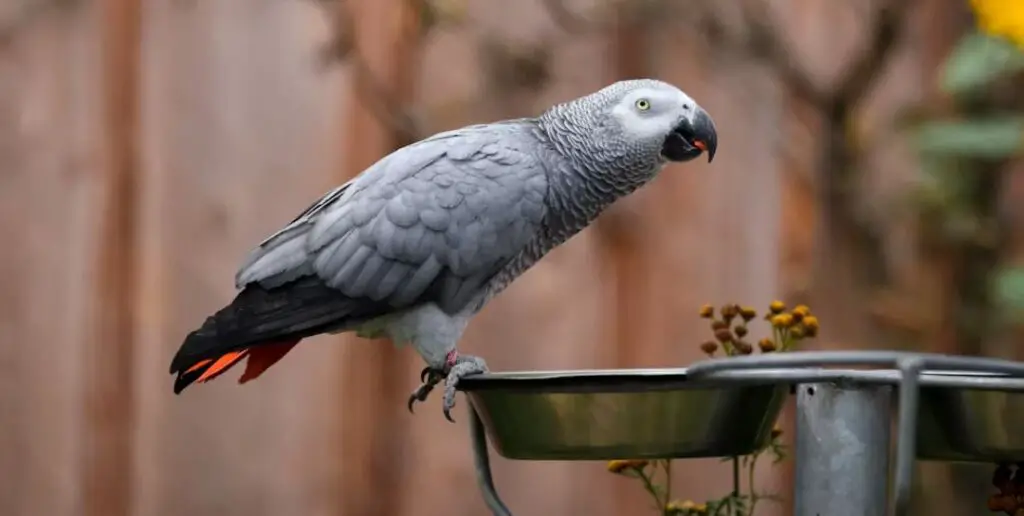
Offering fresh water regularly is crucial for the well-being of your African Grey parrot.
These intelligent birds require hydration to stay healthy and happy. Make sure to provide clean water in a suitable bowl or dispenser, and change it daily to prevent bacteria growth.
Additionally, consider using filtered water to eliminate any potential contaminants.
Remember to monitor the water level throughout the day to ensure your parrot always has access to hydration.
By prioritizing fresh water, you contribute to your African Grey parrot’s overall health and help maintain their vibrant feathers and radiant personality.
4. Providing engaging and interactive toys
When it comes to caring for your African Grey Parrot, providing engaging and interactive toys is essential.
These toys not only keep your parrot entertained but also stimulate their mental and physical well-being.
Look for toys that offer different textures, colors, and shapes, as these can engage your parrot’s senses.
Puzzle toys and foraging toys are also great options, as they encourage problem-solving skills and mimic natural foraging behaviors.
Additionally, rotating the toys regularly can keep your parrot’s interest piqued. Remember, interactive toys not only provide entertainment but also promote a happy and healthy environment for your African Grey Parrot.
5. Maintaining proper environmental temperature
When it comes to caring for your African Grey Parrot, maintaining the proper environmental temperature is essential.
These intelligent birds are native to the rainforests of West and Central Africa, so they thrive in temperatures ranging from 68°F to 78°F (20°C to 25°C).
Ensuring a comfortable temperature for your parrot helps promote their overall well-being and prevents potential health issues.
Consider using a thermostat-controlled heater or air conditioner to regulate the temperature in their living area.
Keep an eye on the temperature fluctuations and avoid placing their cage near drafty areas or direct sunlight.
Remember, providing a consistent and suitable environmental temperature is just one of the many ways to show your love and care for your African Grey Parrot.
6. Providing different perches or climbing platforms
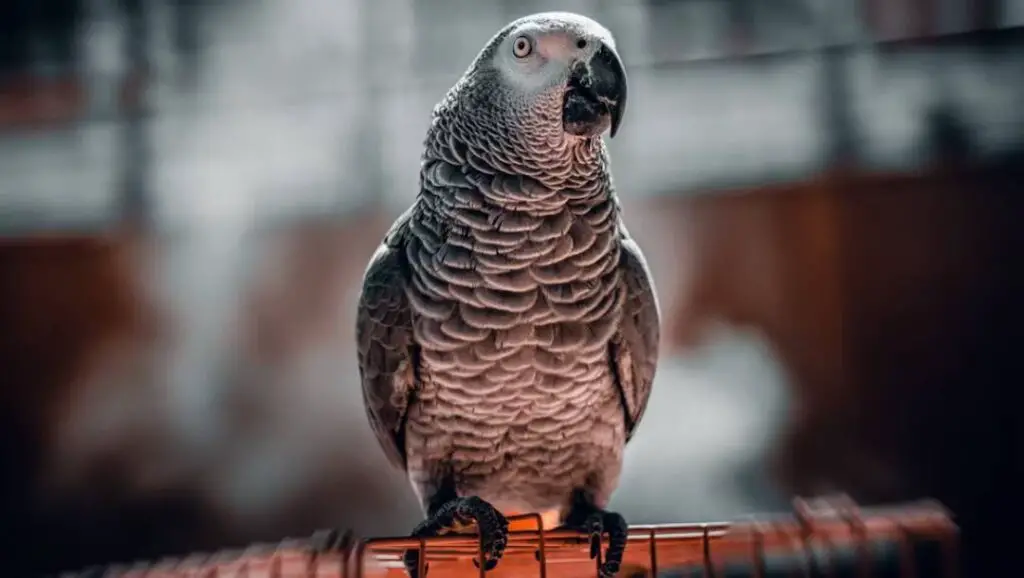
When it comes to caring for your African Grey parrot, providing different perches or climbing platforms is a great idea.
These feathered friends love to exercise and explore, so having a variety of perches will keep them entertained and engaged.
You can consider installing wooden branches of varying thickness and texture, as this mimics their natural environment and promotes foot health.
Adding rope perches or ladders can also give them different levels to climb and play on.
Just make sure to place them strategically throughout their cage to encourage movement and prevent boredom.
7. Proper and regular cage cleaning
Cleaning your African Grey parrot’s cage is an essential part of caring for your feathery friend.
To ensure a clean and healthy environment, follow these steps. First, remove your parrot from the cage and place them in a safe area.
Next, empty out all the bedding and debris from the cage, disposing of it properly.
Use a bird-safe disinfectant to clean the cage thoroughly, paying extra attention to perches, toys, and food/water bowls.
Rinse everything well, making sure no residue remains. Allow the cage to dry completely before adding fresh bedding and returning your parrot.
Remember, regular cage cleaning not only keeps your African Grey healthy, but also promotes a happy and comfortable living space for your cherished companion.
8. Regular cleaning of water and feeding bowls
Caring for your African Grey Parrot involves proper and regular cleaning of their water and feeding bowls.
This ensures their health and well-being. To start, wash the bowls daily with mild soap and warm water.
Rinse thoroughly to remove any residue. Next, sanitize the bowls weekly by soaking them in a solution of white vinegar and water for about 15 minutes.
Scrub gently with a brush to remove any stubborn stains. Lastly, rinse the bowls thoroughly again before refilling them with fresh food and water.
By following these simple steps, you can maintain a clean and hygienic feeding environment for your African Grey Parrot.
9. Allowing at least 1–2 hours of out-of-cage time daily
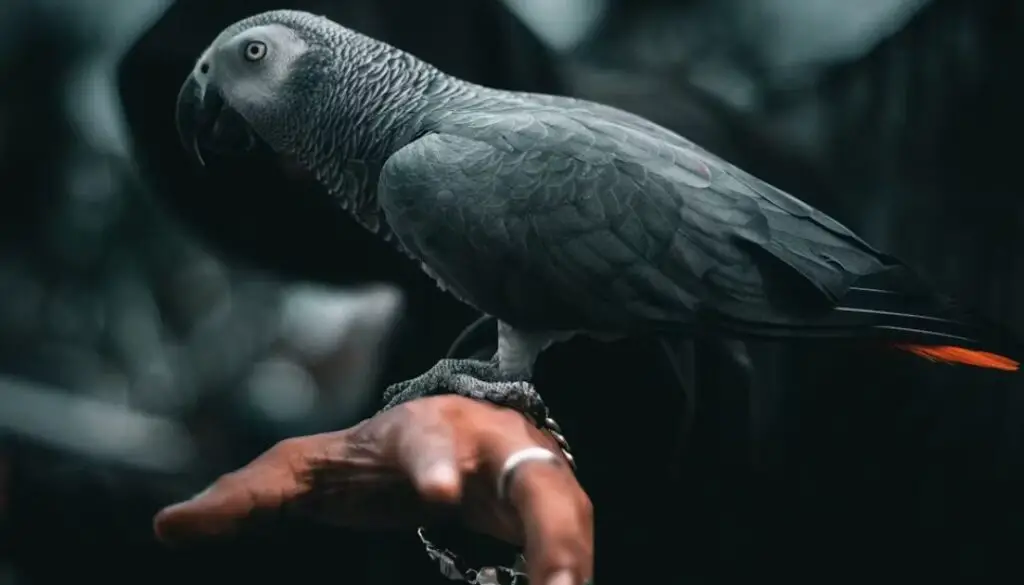
Taking care of your African Grey Parrot involves providing ample out-of-cage time on a daily basis. Allocating at least 1-2 hours for this purpose is crucial.
This time allows your parrot to stretch its wings, explore its surroundings, and engage in mental and physical stimulation.
Interactive playtime outside the cage is important for their overall well-being. It not only prevents boredom but also promotes exercise and socialization.
So, make sure to create a safe and enriching environment for your African Grey Parrot to enjoy its out-of-cage time.
10. Training your African Grey parrot
Training your African Grey parrot is an essential part of caring for your feathered friend.
Not only does it provide mental stimulation, but it also strengthens your bond with your parrot.
Start with basic commands like “step up” and “stay,” using positive reinforcement such as treats or praise.
Gradually introduce more complex tricks like retrieving objects or imitating sounds.
Remember to keep training sessions short and frequent to maintain your parrot’s interest. Patience is key, as each bird learns at its own pace.
So, embrace the interactive and fun aspect of training, and watch your African Grey parrot thrive!
11. Creating a consistent daily routine
Creating a consistent daily routine for your African Grey Parrot is crucial for their well-being and overall happiness.
Start by establishing regular feeding times, ensuring a balanced diet tailored to their specific nutritional needs.
Incorporate interactive playtime sessions, providing mental stimulation through toys, puzzles, and social interaction.
Allocate time for exercise, allowing your parrot to stretch their wings and explore their environment.
Maintain a consistent sleep schedule, providing a quiet and dark space for them to rest undisturbed.
Regular grooming sessions, including nail trims and feather maintenance, should also be part of the routine.
Lastly, don’t forget to shower them with love and attention throughout the day, reinforcing the bond between you and your African Grey Parrot.
12. Providing regular grooming sessions
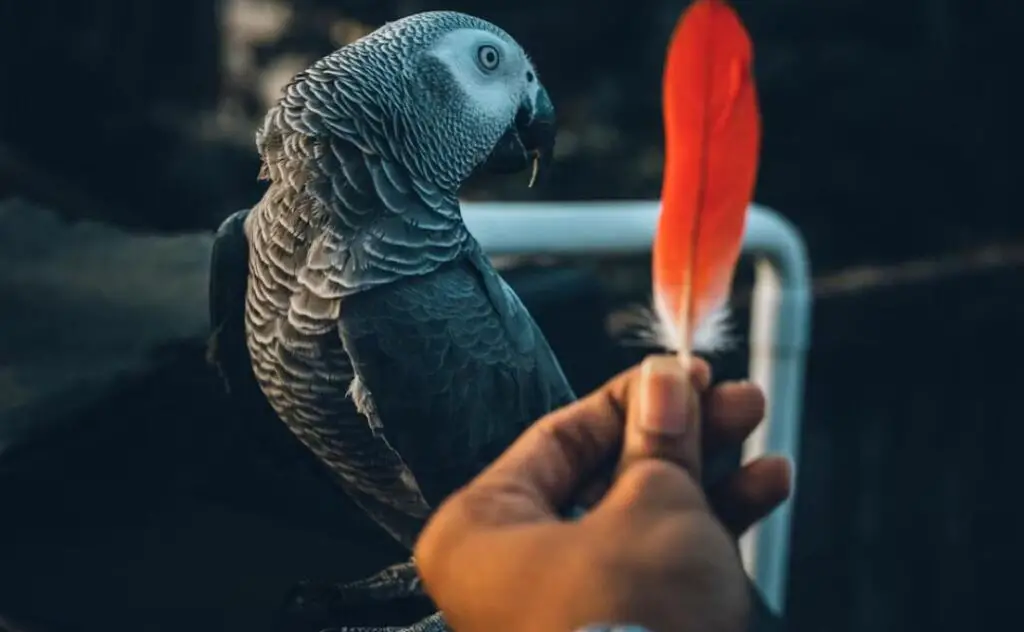
Regular grooming sessions are an essential part of caring for your African Grey parrot.
These sessions not only keep your feathered friend looking fabulous but also promote their overall health and well-being.
Start by gently inspecting their feathers for any signs of damage, mites, or parasites.
Use a soft brush or your fingers to remove any loose feathers or debris. Trim their nails carefully to prevent overgrowth, which can cause discomfort.
Don’t forget to maintain their beak by providing appropriate chew toys and mineral blocks.
Lastly, offer your parrot a refreshing bath, either by misting them with water or providing a shallow dish for them to splash around in.
Remember, regular grooming sessions not only keep your African Grey parrot looking their best but also strengthen the bond between you and your feathered companion.
13. Monitoring for signs of illness and boredom
Monitoring for signs of illness and boredom is an essential part of caring for your African Grey parrot.
It’s crucial to pay close attention to any changes in its behavior or physical appearance.
Keep an eye out for symptoms such as loss of appetite, excessive sneezing, or fluffed-up feathers, which could indicate illness.
Additionally, boredom can lead to destructive behavior, so watch for signs like excessive chewing or feather plucking.
Provide your parrot with plenty of mental stimulation, such as toys and puzzles, to prevent boredom.
Regularly interact with your parrot, engage in training sessions, and offer a variety of toys and activities to keep it mentally and physically active.
If you notice any concerning signs, consult a veterinarian who specializes in avian care for a proper diagnosis and treatment.
By staying vigilant and proactive, you can ensure the well-being and happiness of your African Grey parrot.
14. Providing nutritional supplements
When it comes to caring for your African Grey parrot, providing nutritional supplements such as mineral and vitamin supplements can play a vital role.
These supplements can help ensure that your parrot receives all the essential nutrients it needs for optimal health.
By incorporating these supplements into your parrot’s diet, you can support its immune system, promote healthy feather growth, and enhance overall well-being.
It’s important to consult with an avian veterinarian to determine the specific supplements and dosage that are appropriate for your African Grey parrot.
Remember to always follow the instructions and guidelines provided by the manufacturer to ensure the safety and effectiveness of these supplements.
With proper supplementation, you can contribute to your African Grey parrot’s long-term health and happiness.
15. Providing regular veterinary check-ups
Regular veterinary check-ups are crucial for the overall well-being of your African Grey parrot.
Just like humans, our feathered friends need routine health examinations to ensure they are in optimal health.
These check-ups allow veterinarians to detect any potential health issues early on and provide appropriate treatment.
During these visits, the vet will examine your parrot’s feathers, beak, and nails, as well as listen to their heart and lungs.
They may also recommend specific tests to assess your parrot’s overall health.
By providing regular veterinary check-ups, you are taking proactive steps to ensure your African Grey parrot’s long and healthy life.
So, schedule those appointments and give your parrot the care it deserves!
FAQs
How often should I feed my African Grey Parrot and what should I feed them?
It is recommended to feed your African Grey Parrot a balanced diet consisting of pellets, fresh fruits, vegetables, and occasional treats. Offer fresh food daily and ensure they have access to clean water at all times. Aim for two meals a day, and monitor their weight and overall health to adjust their diet accordingly.
How can I provide mental stimulation for my African Grey Parrot?
African Grey Parrots are highly intelligent birds that require mental stimulation to prevent boredom and behavioral issues. Provide them with plenty of toys, puzzles, and foraging opportunities. Engage in regular training sessions and spend quality time interacting with your parrot through games and socialization.
How can I create a suitable living environment for my African Grey Parrot?
African Grey Parrots need a spacious and secure cage to call home. Ensure the cage is large enough for them to stretch their wings and move around comfortably. Provide perches of varying sizes and textures, as well as toys and enrichment activities. Place the cage in a quiet area away from drafts, direct sunlight, and excessive noise.
Learn more about keeping your African Grey parrot happy.
How can I maintain the overall health of my African Grey Parrot?
Regular veterinary check-ups are essential to monitor the health of your African Grey Parrot. Additionally, maintaining good hygiene is crucial. Clean the cage daily, wash food and water dishes regularly, and provide regular baths or misting sessions for your parrot. Keep an eye out for any changes in behavior, appetite, or droppings, as these could indicate health issues.
How can I train my African Grey Parrot to talk?
African Grey Parrots are known for their exceptional talking ability. To train your parrot to talk, start with simple words or phrases and repeat them consistently. Use positive reinforcement such as treats or praise when your parrot mimics the words correctly. Be patient and consistent with the training, as it can take time for them to develop their vocabulary.
How much social interaction do African Grey Parrots require?
African Grey Parrots are highly social birds and thrive on interaction with their human companions. They need a minimum of 2-3 hours of daily socialization outside of their cage. This can include activities such as playing, training, and simply being in the presence of their human family members. Neglecting social interaction can lead to loneliness and behavioral issues.
Learn more about foods to keep away from your African Grey parrot.
Conclusion
In conclusion, taking care of African Grey Parrots involves providing them with a proper diet, regular mental and physical stimulation, and a comfortable living environment.
These intelligent and social birds can make wonderful pets for the right person, but they do require a significant amount of time and attention.
With patience, dedication, and knowledge of their specific needs, you can ensure that your African Grey Parrot lives a happy and healthy life by your side.
